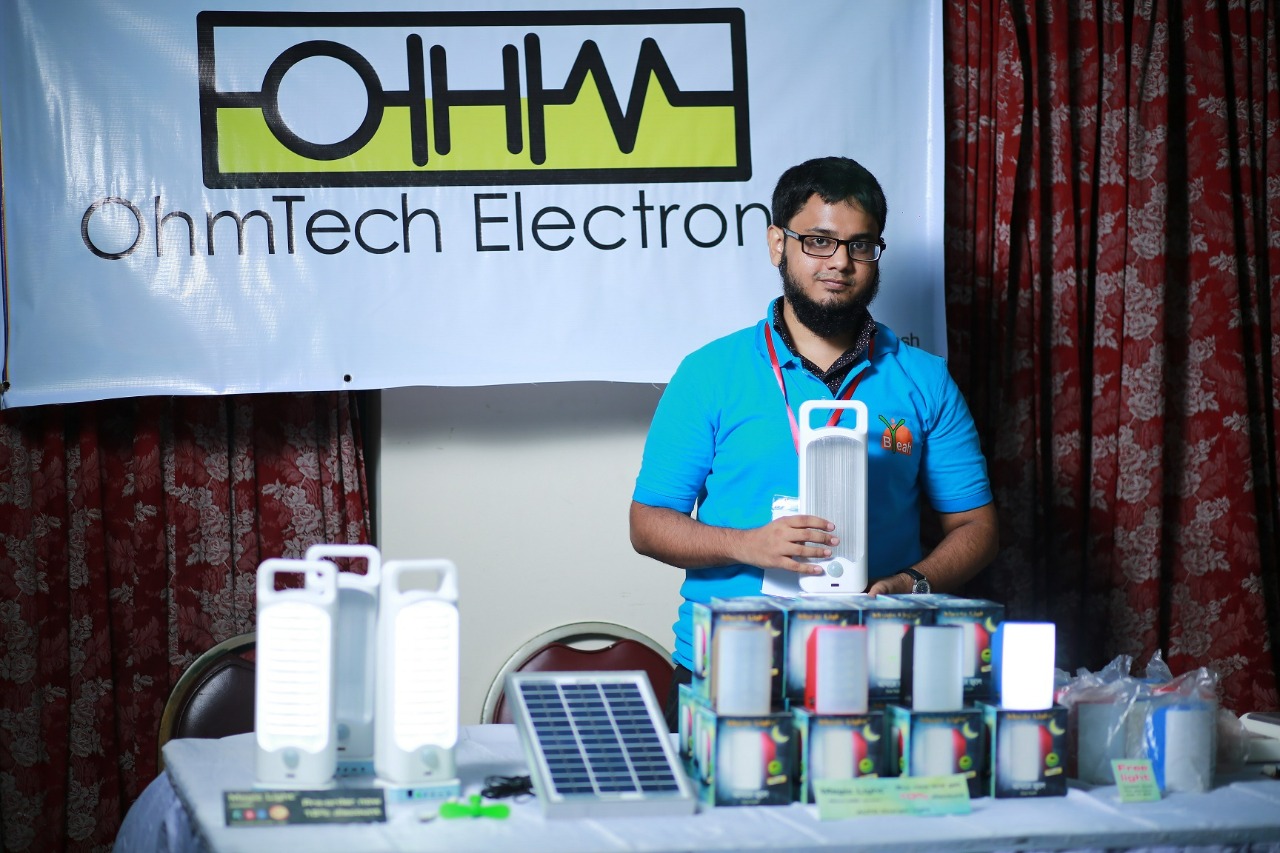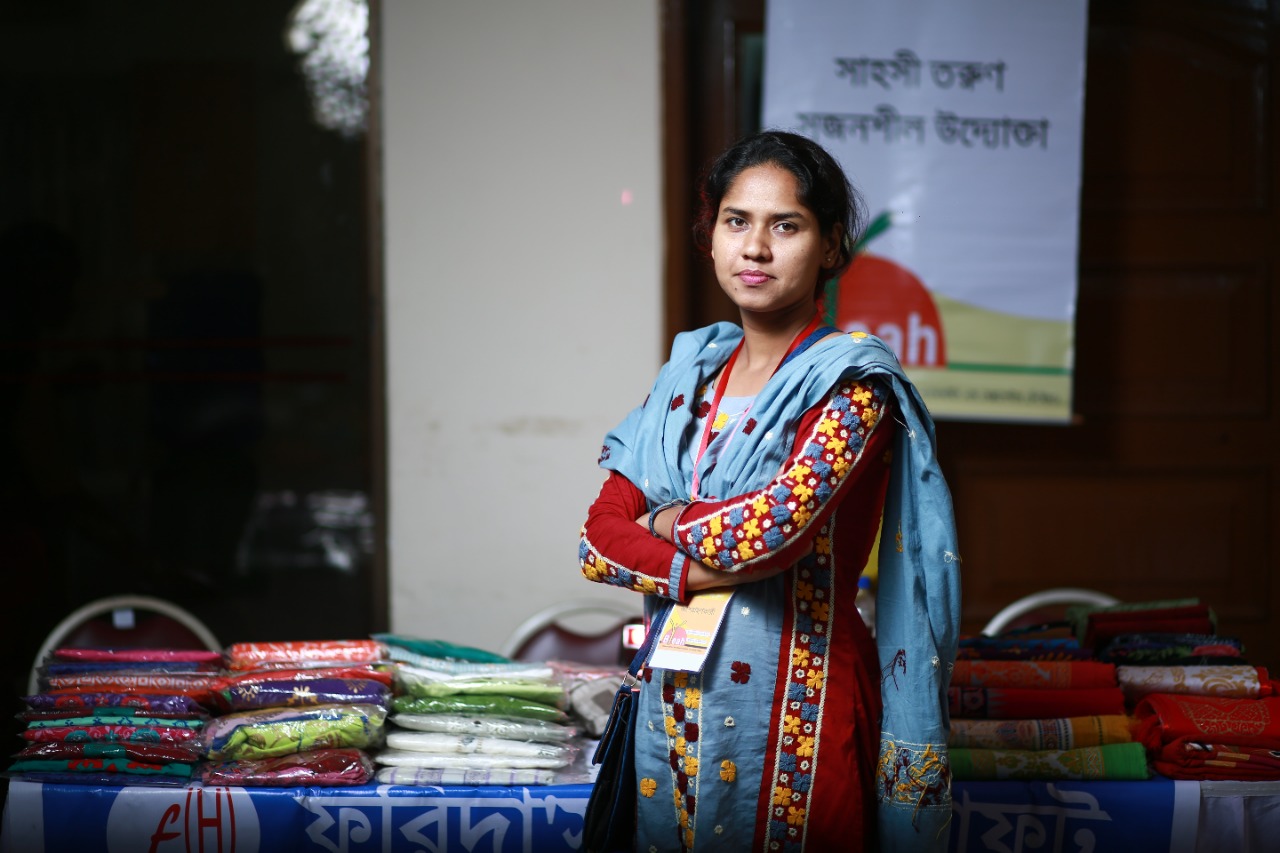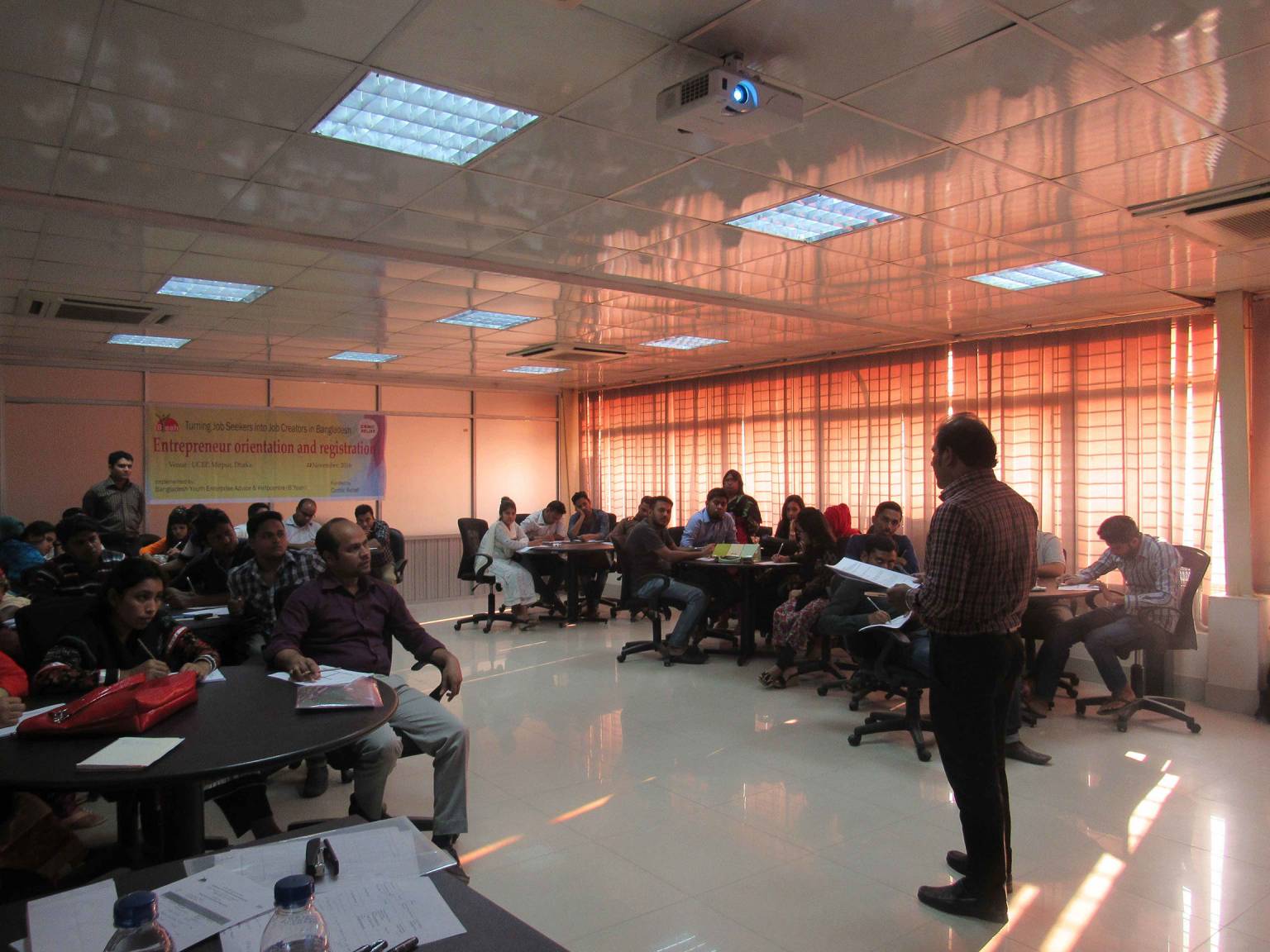
Musa is a final year Honors student at a college in Dhaka under the National University curriculum. Majoring in History, Musa is acutely aware of the fact that the current job market is difficult in Bangladesh. He has been speaking with a couple of seniors from his department who graduated a year ago and have yet to find any stable career opportunities. He has been minding to figure out an alternative. He tried a couple of small enterprises but most did not work out. Musa thinks he lacks the proper understanding and training that are required to make a business successful. He opines the same goes for a few of his senior friends who have been trying their hands in entrepreneurship.
Yusuf started his small business about two years ago. It is limping at best. He says it is hard to grow a business. He struggles with operational acumen. Building a stable team has been a challenge for him. He came to Dhaka from Netrokona and has yet to build a solid network of people to whom he can go for help and advice. Recently, he has been trying to get some additional financing for his business with little success.
Musa and Yusuf represent a large number of young people in Bangladesh who see entrepreneurship as a path out of their challenges in a difficult job market but continue to struggle due to insufficient and often unstructured support available to young people who want to build enterprises.
Bangladesh is a country of young people. As of 2020, around 63.7 percent of the country’s population was under the age of 35. It is an immense blessing for any country. In the simplest term, a young population can work hard, build things, is at their best in terms of productivity, and thus can transform the fate of a nation. In the academic lingo, we call this demographic dividend—the opportunity to profit from the energy of young people. But first of all, you have to put them into productive work.
Unfortunately, unemployment has been one of the ever-rising and present challenges facing the country. And it is the young people who pay most dearly for the lack of employment opportunities. It is not only devastating for individual youths like Musa, but it is equally unfortunate for the country. Unless we handle this challenge head-on, it can create all kinds of social challenges for the country in the coming decade along with taking down our economic gains.
This is where entrepreneurship comes in. To take full advantage of the demographic dividend and use the energy of the young people, entrepreneurship is one of the best interventions. Entrepreneurship can be a potent weapon to address this challenge—creating opportunities for a large number of people — and drive inclusive and sustainable development.
Bangladesh's young entrepreneurship scene has come far over the last decade. The idea of entrepreneurship has gained mainstream attention over the past years. In the past several years, the country has seen an excellent interest in entrepreneurship from a growing crop of young people. Startup culture—exploring opportunities for venture building at the intersection of business and tech—has caught on in the country of late. Support from the Government and other entities has also beefed up. For example, SME loans have become a widespread phenomenon over the past few decades on the back of excellent policy initiatives and private sector efforts.
Despite all these apparent improvements, building a business is not easy in Bangladesh. There are many challenges. The overall environment is not supportive of aspiring young entrepreneurs. Access to knowledge and support is often a challenge. As we see in the case of Musa and Yusuf in the above examples, young entrepreneurs face a multitude of challenges, including education and skills, connection, access to finance, access to market, lack of skilled manpower, and poor training support, poor infrastructure, bureaucratic procedures, etc.
These challenges are particularly telling when we look at the country’s SME sector. Of the approximate 7.9 million SMEs in the country, 60% of women SMEs don’t have access to formal financing. According to a 2013 study, over 40% of SMEs lack access to formal credit, and even those that do have access to credit face a substantial credit gap and unmet demand for formal credit. SME is the sector that accounts for 25 percent of Bangladesh's GDP. The UN has said that these enterprises are essential to the achievement of the Sustainable Development Goals, especially eradicating poverty and generating jobs. This tells much about the challenges young early-stage entrepreneurs endure in Bangladesh.
Entrepreneurship has a cultural imperative attached to it. Access to knowledge and education plays a huge role in the process. While Bangladesh has seen a growing number of initiatives supporting young founders, the entrepreneurship support ecosystem remains in the nascent stage.
Developing entrepreneurship is complex terrain; often supporting aspiring entrepreneurs is not only about finance or training alone. It is a combination of all the things that a founder needs to succeed in his endeavor to build an enterprise. As many people say, it takes a village to grow a startup.
This is where Bangladesh Youth Enterprise Advice and Helpcentre (B'YEAH), a not-for-profit organization with a stated ambition to empower young Bangladeshis to start their own business and realize their dream of becoming successful entrepreneurs, comes in.
Founded in 2007, B'YEAH has done highly impactful work in the youth entrepreneurship development sector. The organization is one of the prominent players in the space supporting young founders with comprehensive support programs from training to access to market and finance support to mentorship and much more.
B'YEAH works with young people aged between 18 and 35, who want to start or grow their business, but lack the education or experience needed. The organization has developed a model of holistic support for young entrepreneurs that include comprehensive knowledge transfer through training, business plan development, access to finance, mentorship, and other business development support.
B'YEAH says it “aims to build a strong community of young entrepreneurs in Bangladesh to facilitate the growth of micro, small and medium enterprises (MSME’s), and tackle youth unemployment and poverty.”
It has seen modest success in its efforts over the past years and is now gearing for an acceleration.
The last few years have seen a long list of organizations doing meaningful work in the entrepreneurship development space in Bangladesh. Many of these organizations have helped accelerate the overall ecosystem in the country. B'YEAH is easily one of the highly impactful organizations in the space. One distinction about B'YEAH is that the organization has been uniquely focused on youth entrepreneurship in Bangladesh. The focus on a single issue has afforded the company to go deeper into the challenge and develop a distinct program. Doing one thing well is an advantage that we often overlook.
B'YEAH has designed programs and solutions that take into consideration the nature and nuances of the challenges young entrepreneurs face and has developed a structured approach to its work of empowering young entrepreneurs.
More importantly, while many entrepreneurship development programs focus predominantly on the educated urban young population, B'YEAH has been working with marginalized and opportunity deprived young people, a segment of the young population often missing in the mainstream discussion, especially the youth in NEET (Not in Education, Employment and Training). The organization says “it aspires to build a strong community of young entrepreneurs in Bangladesh to facilitate the growth of micro, small and medium enterprises (MSMEs).”
The intervention starts with an extensive outreach program to reach out to potential young people who are either building their businesses or want to start their own businesses with a focus on reaching disadvantaged populations. For the outreach program, it works with partner organizations such as UCEP, The Hunger Project, BEST, etc. A relationship model allows B'YEAH to reach extensively across regions to find and meet potential young founders, providing the necessary support to become successful entrepreneurs.
Through the outreach program, young people can enroll in various B'YEAH workshops that train them on the basics of venture building, and develop a proper understanding of business plan preparations, and other fundamental aspects of entrepreneurship. Aspiring young entrepreneurs can fill up the necessary forms for a B'YEAH workshop. Workshops often come without any fees.
After the initial workshops, B'YEAH has developed a series of training programs that address various aspects of entrepreneurship in-depth. While initial workshops offer orientation in venture building of sorts, training programs are rigorous and offer practical knowledge and skills to start and run an enterprise.
There are training programs on business plan development, business development, marketing, growth, management, finance and accounting, networking, legal aspects of running a business such as VAT, tax, etc, and so on.
Furthermore, to ensure access to knowledge and guidance, the organization has developed a mentorship model unique in Bangladesh where industry experts work closely with young founders to guide them. Using a model developed by its international partner Youth Business International (YBI), an international organization based out of the UK supporting youth entrepreneurship across the world, B'YEAH has developed an active mentorship program in Bangladesh where it connects young founders with successful entrepreneurs and industry experts. The program has proved to be hugely effective in supporting young founders. B'YEAH is an active partner of YBI. The mostly volunteer-led mentorship program directly addresses the operational and knowledge challenges that most young entrepreneurs face in the early days of their business.
Over the years, B'YEAH has built an excellent trainers and mentors pool of stakeholders, founders, business professionals, and entrepreneurship development experts.
Mentorship has evolved into a major component of B'YEAH’s young entrepreneurship development program. It has since expanded the program and now also provides group mentorship, peer mentorship, etc.
Similarly, to improve the outcome of mentorship, the organization also organizes training sessions for mentors.

Along with the necessary knowledge and capacity-building support, B'YEAH has also been working to design interventions to help young aspiring founders in both access to market and access to finance.
Access to finance is a major challenge for young entrepreneurs in Bangladesh. When it comes to access to finance from formal channels such as banks, young entrepreneurs suffer from various disadvantages that we usually overlook because they are intuitive and contextual.
First, the majority of early-stage businesses are small which makes them inconspicuous for bank loans. The design of these businesses — that is: they are built and run by the owners — does not allow them to grow beyond a certain size. And many young entrepreneurs have a limited understanding of the overall management system. These limitations negatively affect their growth and the prospect in the eyes of financial institutions as potential borrowers.
Second, there are other aspects to it. Many young entrepreneurs feel discouraged and even intimidated to go to banks due to a lack of understanding of how the whole thing works. And many of these entrepreneurs find formal financial institutions unapproachable and out of reach.
Third, since young entrepreneurs run their businesses themselves, they usually are not able to dedicate enough time to other pursuits. Securing loans takes time — you need to go to banks, meet people, prepare files, maintain communication, and so on. Most young founders do not have time for this in the early days.
Finally, many young entrepreneurs lack basic documents such as trade licenses, TIN Certificates, and financial statements necessary to secure loans from banks.
B'YEAH has been working to build partnerships with financial institutions, banks, and other relevant partners to help its entrepreneurs access financing opportunities. For instance, B'YEAH has a partnership with Midas Finance where it sends its eligible founders for SME loans and other financial support. It also connects its beneficiaries with the SME foundation under a collaboration. The organization says it plans to further invest in building a network of support for young entrepreneurs.
B'YEAH is not only continuously innovating its unique young entrepreneurship development programs, but the organization is also working towards being an active player in policy advocacy where it promotes youth-friendly policies in Bangladesh along with its partner organizations and govt. stakeholders.
B'YEAH’s work supporting youth entrepreneurship has yielded an enormous impact over the past years. The organization says that it has reached some 4200 young people, directly trained more than 2000 aspiring entrepreneurs, created a decent work environment in more than 250 enterprises, helped create over 300 business plans, created more than 1500 new employment opportunities, and has built a network of over 100 volunteer mentors and more than 1400 market linkage opportunities for its entrepreneurs.
B'YEAH does not stop at providing support only, the organization has developed a model to provide regular support and maintain consistent communication with the entrepreneurs. The organization says to stay up-to-date on the status of all its entrepreneurs and mentors, B'YEAH has developed several mechanisms including regular phone calls to the entrepreneurs, weekly mentor-mentee coordination meetings, periodic events with the entrepreneurs, etc. The follow-up helps entrepreneurs stay motivated and also seek help when they need it.
B'YEAH is now looking to do more. As the digital economy grows in Bangladesh, B'YEAH is working to develop courses and training programs to support young people with digital skills so that they can build solutions for the digital world. It is also working on a program for training young people on freelancing skills and working on a project where it plans to connect women home-makers who want to sell homemade foods with the on-demand food delivery platforms.

B'YEAH has recently introduced a business competition called Bangladesh Youth Enterprise Competition and an impact incubator program named B'YEAH Impact Incubator and Accelerator to support young people with ideas to build enterprises that address UN SDGs.
The organization says while it scales its existing training and mentorship programs, it also plans to go deeper and provide more comprehensive support to young people building enterprises, especially the social and green entrepreneurs. To that end, an impact incubator program makes complete sense.
Incubator and accelerator programs support early-stage, growth-driven enterprises through education, mentorship, network, and funding. These programs usually are fixed-term, cohort-based, and usually end with a demo day or pitch event. Compared to other entrepreneurship support programs, incubators are structured, outcome-oriented, and rigorous.
B'YEAH says its inaugural incubator cohort will be launched in the first week of May 2022 and the selected startups will get a total of BDT 9 lacs as seed money and get the opportunity to be a part of a global network of entrepreneurs via Youth Business International (YBI). In addition, these businesses will also receive mentorship, business-building support, investors connections, other relevant support, etc.
Our world today faces a long list of complex and multidimensional challenges. These challenges demand a comprehensive response. Entrepreneurship where people take initiative to make a difference can be an antifragile response to these pressing challenges our society faces today.
The approach B'YEAH has taken over the years offers both inspiration for and insight into designing effective strategies for empowering young entrepreneurs in Bangladesh by providing training, access to finance, market, and opportunities so that young aspiring entrepreneurs can grow to their full potential.
For B'YEAH, however, this is just the beginning. While the organization has done meaningful work in the past years, it has a long way to go and should pay attention to building a sustainable and impactful organization going forward.
